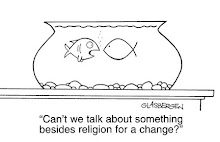Deuteronomy 5:7
Strikingly, the initial thing about this Commandment is how utterly unique this command would have been in a primitive culture that was incredibly polytheistic as well as syncretistic. It must have sounded REALLY strange to the Israelites within the Canaanite culture, that of all things, Yahweh would demand their singular fidelity. It would have appeared to them in fact as almost atheistic. And given the prevailing view of gods as being indigenous as well, down right dangerous.
There is no getting around it that the Christian God demands that we be exclusive over and against all other manifestations of any other gods in the world in which we live. For more on this, its worth reading: Four Views of Salvation in a Pluralistic World (Zondervan 1996) where the authors lay out this argument within a contemporary context. Additional studies involving the emerging phenomena of 'Post-Modernism" would also be very helpful as well! Jamie Smith's popular book: "Who's Afraid of Post-Modernism" is a good start.
The real issue for the Christian who buys into the exclusive demand of the 1st Commandment has to do with how this is perceived within our current contemporary culture. In particular, the ability to travel, internet search engines, the visual media and the phenomena of globalism has raised substantially, the intermingling of a myriad of global cultures. Some might find it fascinating, for example, that an increasing number of work environments are providing accommodation's to those who wish/need to worship at their office site.
The USA is post-Christian not only because of the culture's rejection of the Christian meta narrative; but also due to the emergence of, and embracing of, other meta narratives introduced from throughout the world. None of this is about to go away any time soon... if for nothing else, other than that globalism will not permit it to go away.
The ideological dynamic of our world is no different today than it was in the ancient history of Israel; and as it was in the Mediterranean Basin in the toxicity that it presents to other worldviews themselves. Therefore, I think its crucial to remember that those of us who claim an exclusivist position will often be perceived as: Insensitive, Against Diversity, Elitist, Arrogant, Uninformed, Uneducated, Non-Affirming, Naive, Simpleminded and Bigoted/Prejudiced. And some of us will be summarily dismissed, censored and even disciplined (within the work place etc.) because of the perception of "intolerance."
Our trajectory by which we engage our pluralistic, mult-cultural and poly-theistic culture must change. We can no long afford any traditional assumptions on this issue. Instead of confidently and exclusively, declaring from the front - to those who do not know God, we must carefully merge in from the side and walk alongside as we authentically live life with them. Let the power of the authenticity of our faith - the "in Christ" presence that the Apostle Paul talks so much about, to be a primary means by which we share the gospel.
Strikingly, the initial thing about this Commandment is how utterly unique this command would have been in a primitive culture that was incredibly polytheistic as well as syncretistic. It must have sounded REALLY strange to the Israelites within the Canaanite culture, that of all things, Yahweh would demand their singular fidelity. It would have appeared to them in fact as almost atheistic. And given the prevailing view of gods as being indigenous as well, down right dangerous.
There is no getting around it that the Christian God demands that we be exclusive over and against all other manifestations of any other gods in the world in which we live. For more on this, its worth reading: Four Views of Salvation in a Pluralistic World (Zondervan 1996) where the authors lay out this argument within a contemporary context. Additional studies involving the emerging phenomena of 'Post-Modernism" would also be very helpful as well! Jamie Smith's popular book: "Who's Afraid of Post-Modernism" is a good start.
The real issue for the Christian who buys into the exclusive demand of the 1st Commandment has to do with how this is perceived within our current contemporary culture. In particular, the ability to travel, internet search engines, the visual media and the phenomena of globalism has raised substantially, the intermingling of a myriad of global cultures. Some might find it fascinating, for example, that an increasing number of work environments are providing accommodation's to those who wish/need to worship at their office site.
The USA is post-Christian not only because of the culture's rejection of the Christian meta narrative; but also due to the emergence of, and embracing of, other meta narratives introduced from throughout the world. None of this is about to go away any time soon... if for nothing else, other than that globalism will not permit it to go away.
The ideological dynamic of our world is no different today than it was in the ancient history of Israel; and as it was in the Mediterranean Basin in the toxicity that it presents to other worldviews themselves. Therefore, I think its crucial to remember that those of us who claim an exclusivist position will often be perceived as: Insensitive, Against Diversity, Elitist, Arrogant, Uninformed, Uneducated, Non-Affirming, Naive, Simpleminded and Bigoted/Prejudiced. And some of us will be summarily dismissed, censored and even disciplined (within the work place etc.) because of the perception of "intolerance."
Our trajectory by which we engage our pluralistic, mult-cultural and poly-theistic culture must change. We can no long afford any traditional assumptions on this issue. Instead of confidently and exclusively, declaring from the front - to those who do not know God, we must carefully merge in from the side and walk alongside as we authentically live life with them. Let the power of the authenticity of our faith - the "in Christ" presence that the Apostle Paul talks so much about, to be a primary means by which we share the gospel.







No comments:
Post a Comment